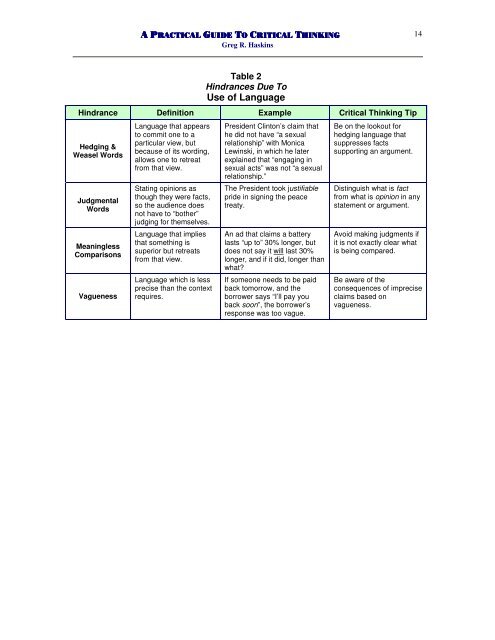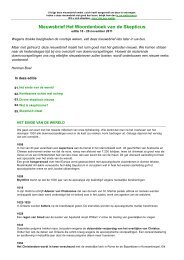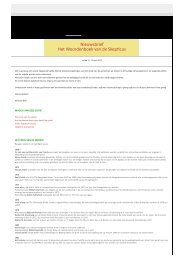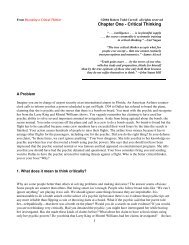A Practical Guide to Critical Thinking - The Skeptic's Dictionary
A Practical Guide to Critical Thinking - The Skeptic's Dictionary
A Practical Guide to Critical Thinking - The Skeptic's Dictionary
Create successful ePaper yourself
Turn your PDF publications into a flip-book with our unique Google optimized e-Paper software.
Greg R. Haskins<br />
14<br />
Table 2<br />
Hindrances Due To<br />
Use of Language<br />
Hindrance Definition Example <strong>Critical</strong> <strong>Thinking</strong> Tip<br />
Hedging &<br />
Weasel Words<br />
Judgmental<br />
Words<br />
Meaningless<br />
Comparisons<br />
Vagueness<br />
Language that appears<br />
<strong>to</strong> commit one <strong>to</strong> a<br />
particular view, but<br />
because of its wording,<br />
allows one <strong>to</strong> retreat<br />
from that view.<br />
Stating opinions as<br />
though they were facts,<br />
so the audience does<br />
not have <strong>to</strong> “bother”<br />
judging for themselves.<br />
Language that implies<br />
that something is<br />
superior but retreats<br />
from that view.<br />
Language which is less<br />
precise than the context<br />
requires.<br />
President Clin<strong>to</strong>n’s claim that<br />
he did not have “a sexual<br />
relationship” with Monica<br />
Lewinski, in which he later<br />
explained that “engaging in<br />
sexual acts” was not “a sexual<br />
relationship.”<br />
<strong>The</strong> President <strong>to</strong>ok justifiable<br />
pride in signing the peace<br />
treaty.<br />
An ad that claims a battery<br />
lasts “up <strong>to</strong>” 30% longer, but<br />
does not say it will last 30%<br />
longer, and if it did, longer than<br />
what?<br />
If someone needs <strong>to</strong> be paid<br />
back <strong>to</strong>morrow, and the<br />
borrower says “I’ll pay you<br />
back soon”, the borrower’s<br />
response was <strong>to</strong>o vague.<br />
Be on the lookout for<br />
hedging language that<br />
suppresses facts<br />
supporting an argument.<br />
Distinguish what is fact<br />
from what is opinion in any<br />
statement or argument.<br />
Avoid making judgments if<br />
it is not exactly clear what<br />
is being compared.<br />
Be aware of the<br />
consequences of imprecise<br />
claims based on<br />
vagueness.






